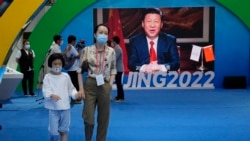China already has one of the world’s largest economies. However, it cannot yet fully support its technology industry. It does not make its own computer processors, or chips.
Factories in China build cars, computers and smart phones. But they need parts from countries including the U.S., Japan, Taiwan, South Korea and some European nations.
If China’s diplomatic relationship worsens with any of these countries, its technology businesses might have problems.
“Self-reliance is the foundation for the Chinese nation,” President Xi Jinping said in a speech last March. He said China must become a technology leader to protect its “national economic security.”
China’s first move is to help one of its largest companies, Alibaba, make computer chips.
So far, Alibaba is best known for its internet business, which includes selling items and providing data storage. But in the last three years, Alibaba’s company T-Head started making chips. It now makes three models and said they are not for sale outside of China.
Two other companies, including Tencent, a company that develops games and other social media are working on building chips, too.
If China is successful in closing its technology industry to the world, experts say trade, inventive effort and wealth might lessen around the world.
But the same experts say China will find it risky and difficult to meet the goal of complete technological independence. Peter Hanbury is with Bain & Co. Bain is a company based in Boston, Massachusetts that studies industry and offers advice to businesses with the goal of helping them solve problems and earn money. Hanbury said it is hard to imagine one country building everything it needs and also having the best technology.
The experts also say it will be hard for China to get everything it needs if it separates its technology industry from the rest of the world. If something new is created in a country China does not trade with, the industry in China could suffer.
U.S. and European officials are concerned about China’s goal. Experts say a separation might hurt technology worldwide because it is hard to develop parts and software that work on different systems at the same time.
The issue also worries the United Nations. In September, U.N. Secretary-General Antonio Guterres told The Associated Press that the United States and China needed to “avoid that the world becomes separated.”
China’s concern about computer chips grew over the last two years as work at chip factories slowed because of COVID-19. Computer chips are China’s largest import.
One example of the way the policies of one nation affect technology and economic development came in 2018. That year, the U.S. declared Chinese tech company Huawei a security risk. It barred the company from using U.S. technology. The U.S. declared Huawei a risk to cyber-security.
Huawei has denied the accusation. But, it can no longer buy computer parts made in the U.S.
The conflict between the U.S. and Huawei continues today. In 2020, the U.S. barred factories around the world from using American technology to make chips for Huawei.
Another problem for China’s technology industry is it has very few factories to produce chips once they are designed. Experts say Chinese manufacturing is about 10 years away from being able to equal the production of large chipmakers.
Even if companies like Alibaba get better at designing chips, the tools they need to produce them are restricted by the governments of the U.S. and some European countries.
The Semiconductor Industry Association said China “lags significantly” in everything it needs to be able to make the chips.
Experts say China also faces measures by nations to restrict their technologies from use in China. China is currently in a 15-year-window for investing $150 billion in its chip industry. The window closes in 2030. That sounds like a lot of money, but other companies are investing more in shorter periods of time.
China’s interest in buying equipment from a company in Europe is also an issue of concern for international officials.
The newest chip-making technology is called photolithography. The world leader is a company in The Netherlands called ASML. A company in China called SMIC wants to buy equipment from ASML but so far, the Dutch government has not yet decided to make a sale.
I’m Dan Friedell.
Dan Friedell adapted this story for Learning English based on a report by Joe McDonald of the Associated Press.
What will China need to do in the future to make sure it reaches its goal of “tech self-reliance?” Tell us in the Comments Section and visit our Facebook page.
____________________________________________________________________
Words in This Story
self-reliance – n. the ability to get work done without help from others
lag – v. to happen more slowly than expected or wanter
significantly – adv. used to say that something is important or meaningful
window – n. a period of time during which something can happen









